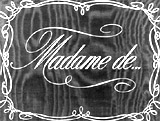
|
The Earrings of Madame De...
(1953, Fr./It.)
In director Max Ophul's period romantic melodrama
- it was about deception and tragic romance as a pair of
earrings was passed amongst wealthy aristocrats; the film was remarkable
for the director's sweeping and moving camera and B/W cinematography
- [Note: The theme of the passage of an object (or animal) as its
importance or meaning changed, was similar to other films, such as Tales
of Manhattan (1942), Anthony Mann's Winchester '73 (1950), Au
Hasard Balthazar (1966, Fr./Swe.), The Red Violin (1998),and War
Horse (2011).]:
- the B/W film opened with a prologue (three title
cards): "Madame de ... was a very elegant, distinguished and celebrated
woman, seemingly destined to a delightful, uncomplicated existence.
Probably nothing would have happened had it not been for those
jewels...."
- in the film's opening scenes,
the pretty, flighty, and spoiled Countess Madame Louise de... (Danielle
Darrieux) was forced to discreetly sell her pair of heart-shaped
diamond earrings, an expensive wedding gift from her cool-headed,
stiff, determined and aristocratic, high-ranking military officer
husband André (Charles Boyer), to pay off her debts (20,000 francs) due to
her lavish spending; she sold them back to the original jeweler
Monsieur Rémy (Jean Debucourt) who had earlier sold them
to her husband; the Countess and André were in a love-less
marriage - she often entertained suitors
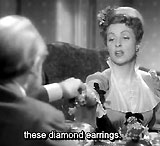
First Transactional Sale of the Earrings to Jeweler Mr. Rémy
by Louise/The Countess
|
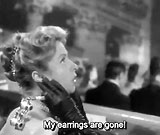
At the Opera: "My earrings are gone!"
|
- when she suspiciously and
falsely claimed that the earrings were lost at the Opera, it was
publicized in the newspaper ("THEFT AT THE THEATRE");
Mr. Rémy became worried that he might be responsible: ("It could ruin the
shop), and awkwardly sold them back to André, without the
Countess' knowledge
- the miffed husband with wounded pride transferred
them to his secret heartbroken mistress Lola (Lia Di Leo), who
was permanently leaving him and departing on a train from the station
for a holiday vacation to Constantinople
- the estranged and impersonal married couple discussed
the loss of the earrings, notably speaking to each other from beds
in separate bedrooms, and both knowing that each of them had deceived
the other
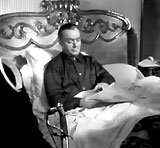
|
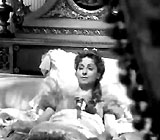
|
|
André and Louise In Separate Bedrooms
|
- once Lola arrived at her destination, she traded
in the "souvenir" earrings
to make up for her casino gambling losses at the roulette table
- Italian Baron Fabrizio Donati (Vittorio de Sica)
purchased the earrings from a Constantinople pawn shop three months
before traveling to Paris, France to serve in a high diplomatic
position; coincidentally, he later became acquainted with the Countess
in France, after first glancing her in a customs office in Basel
(Switzerland), and then two weeks after when their horse-drawn
carriages crashed into each other in Paris and he told her that
they were destined to meet
- the infatuated Baron pursued her until
she reciprocated and they began a romantic affair -
the beginnings of a love triangle; Andre was already aware of the Baron
and had earlier met him at several embassy functions; the Countess
and the Baron happened to be seated together at a state dinner, and
during this and other social functions, the two danced together at
fancy balls, emboldening their love for each other; masterful camera
techniques included the use of several ellipsis that were linked by
match cuts and fades to symbolize their growing attraction and affection
over time
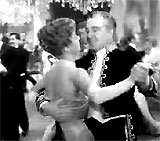
|
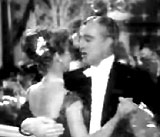
|
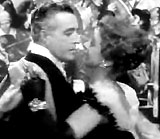
|
|
Dancing (and Circling) Over Time As Their Affections
Heated Up
|
- over time, André became
fully knowledgeable about the flirtatious Countess'
dalliances with the Baron, when she announced that she would take
a long restful holiday by herself to the Italian Lakes region;
to the Countess' complete surprise, Donati presented her with a
going-away gift of roses and her own earrings before her departure;
she exclaimed to herself: "They had to go to Constantinople
to make their way back to me"; they parted without a kiss
as she told him facetiously:
"I don't love you"
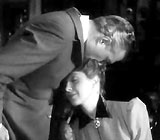
|
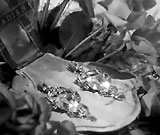
|
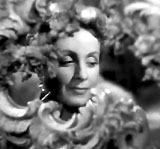
|
|
Donati's Gift of Her Own Earrings
|
- after visiting seven Italian towns in five weeks,
the restless Countess felt the urge to return to Paris;
the Baron also missed her during her absence and often wrote letters;
although Louise sent flowers, she also wrote reply letters to each
one to tell him of her "blossoming love," but then never
sent them:
"I never had the courage to mail my replies"
- once she
returned, the two surreptitiously met and kissed, and the Countess
confessed: "My earrings. Thanks to them, you were always at my side.
They were my only comfort. I shall wear them always"; again,
she told him: "I don't love you, I don't love you"; however,
she attempted to prevent André from seeing that she had
her earrings back since they were symbolic of her affair with her
lover; she hid them inside her long gloves stashed in her tall
dresser drawer in her bedroom, but then pretended that she had
found them - to explain their disappearance on the night of the
Opera; André feigned surprise ("Incredible indeed"),
but knew that she was obviously
lying (she later admitted to Donati that she told "a little
white lie")
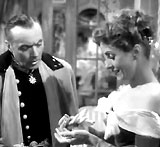
Louise's 'Discovery' of Her Earrings in Her Long Gloves, In Front
of Her Husband
|
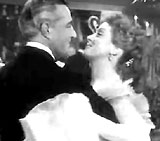
At Another Formal Ball, Louise (Wearing the Earrings) Danced with the Baron
|
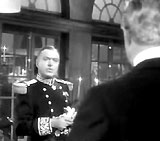
The General Confronted Donati, and Ordered
Him to Sell the Earrings
|
- the telltale earrings continued
on their transactional journey at another formal ball, where
Louise had been openly wearing them during a waltz-dance with Donati;
she told him: "I want to be seen by you and you alone"; after
ordering Louise to remove the earrings, General
André confronted the womanizing Donati
in the smoking room about the earrings given by him to his wife
- he explained how they were previously a wedding present - but now
they provided evidence of Louise's promiscuous relationship and
her constant deceptions and lies
- the General pressured Donati
to sell them back to his jeweler, to facilitate his re-purchase of
the earrings for her (it would be their third purchase); Louise fainted
knowing about the confrontation due to her utter humiliation, and
also became extremely despondent and depressed when she was forced
to end her affair with Donati (Donati: "We must never meet
again...I'm no longer with you, Louise")
- Louise was overwhelmed with joy when the earrings
were given back to her, but then was dismayed when André compelled
her to give her returned earrings to his young niece Elizabeth
who had just given birth to a child
- to save her husband from bankruptcy,
the niece sold the earrings back to Monsieur Rémy who again
offered to sell them back to André (for the fourth time),
but he angrily refused. Desiring the earrings herself, the Countess
decided to buy them back from Mr. Rémy (after selling
her precious furs and other jewelry), and she told her husband
what she had done - to spite him; he responded: "You're trying
to turn remorse into memories...Don't escape like this into a world
of sickness and silence"
- André jealously confronted Donati at a gentlemen's
club, and challenged him to a pistol duel. The General prepared
himself with target practice, putting three shots in the heart
on the target (echoing the heart-shaped earrings)
- the Countess feared that if
Donati accepted the duel challenge, he would be shot dead: ("He's
an excellent shot. He'll kill you!" It's suicide!");
she begged that he not go through with it: ("How can
you fight over a crazy woman like me? I'm not worth it. I'm not
even pretty any more"); she stressed
that the two of them hadn't even had sex, and their love was dead:
"We've given him no further reason...But you don't even love
me anymore"
- she visited the church to pray
at St. Geneviève's shrine to save Donati's life: ("Save
him, dear saint. You know that we were guilty in thought only. And
what are thoughts? Will you save him, my dear Saint?"); she placed her
beloved earrings onto the altar - gifting, donating, and bequeathing
them to the Saint
- as she approached the
dueling field, she heard only one shot (presumably from André who
fired first since he was the "offended party," with the implication
that Donati was shot dead) - the outcome remained ambiguous; due
to racing up a steep hill (with a weak heart), she fainted and fell
against a tree - and died of a heart attack
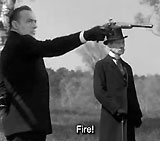
The General Firing First in the Duel
|
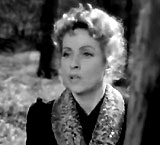
The Countess Slumping Against a Tree - and Dying
|
- the film came full circle
in the conclusion - the Countess' earrings were viewed
on the church's altar as a "Gift of Madame De..."
|
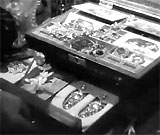
Madame Louise's Heart-Shaped Diamond Earrings in a Jewelry
Box (right hand corner)
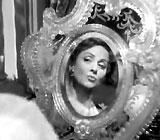
Countess Madame Louise de... (Danielle Darrieux)
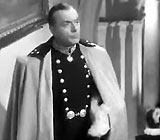
High-Ranking Military Officer Husband General André (Charles Boyer)
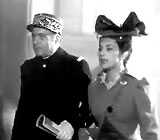
André's Departing Mistress Lola ( (Lia Di Leo) Was Given the Re-Purchased
Earrings as a "Souvenir"
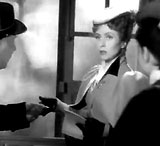
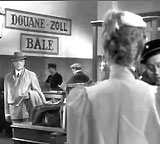
First Encounter in Basel Between the Countess and the Baron
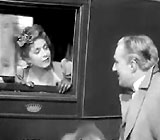
Second Encounter After Their Carriages Crashed
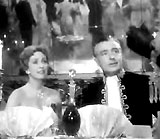
The Flirtatious Countess with the Baron Seated Together
at a State Dinner
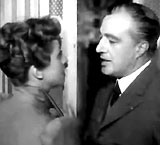
A Kissless Goodbye with the Baron as the Countess Departed for the Italian
Lakes Region
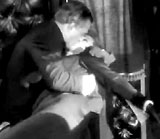
The Countess' Return to Paris for a Passionate Rendezvous with the Baron
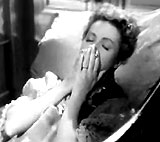
Louise's Joy At Receiving Her Earrings Back From Her Husband
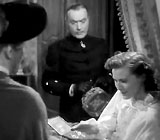
Earrings Given by Louise to Niece
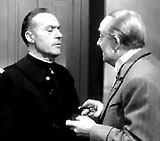
Earrings Offered to the General a Fourth Time by Mr. Remy - He Refused
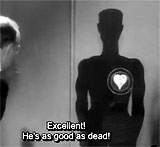
Dueling Pistol Practice for the General - Into a Heart-Shaped Target
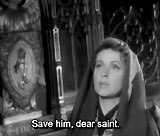
The Countess Praying to St. Geneviève to Save Donati's Life
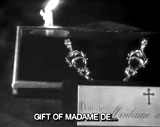
The Film's Final Image: The Countess' Gift to the Saint's Shrine
|

















